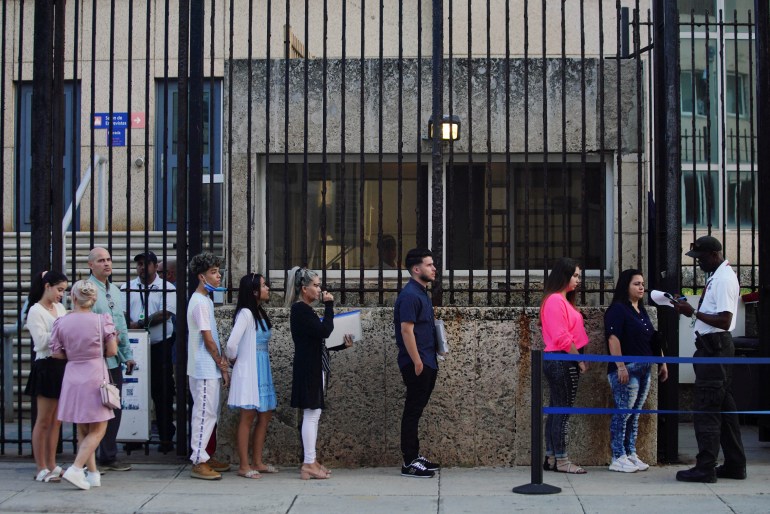US embassy in Cuba resumes full immigrant visa services
Resumption of visa and consular services in Havana comes amid record migration from the Caribbean island to the US.

The United States has resumed full immigrant visa services at its embassy in Cuba’s capital, five years after Washington closed consular services in Havana due to a spate of unexplained health incidents.
In a statement last week, the embassy confirmed that it would begin processing immigrant visas on Wednesday, including permits for Cubans reuniting with family in the US and others chosen through the diversity visa lottery.
Keep reading
list of 3 itemsUS Coast Guard sends 119 migrants back to Cuba
Florida islands face ‘crisis’ as nearly 500 asylum seekers arrive
Since 2017, many Cubans have been forced to travel to third countries – notably Guyana in South America – to submit US visa requests.
“Everything went very fast,” said Melissa Vazquez, 18, after submitting her application on Wednesday. She explained that she had been waiting seven years to be reunited with her father, who lives in the US.
“I have to come [back to] fetch my visa, and I can travel,” she said.
The resumed services come amid record migration from Cuba to the US, which has fuelled calls for US President Joe Biden’s administration to open more legal pathways to Cubans and start a dialogue with the Cuban government, despite a historically tense relationship.

In April of last year, representatives from the two countries held the highest-level diplomatic talks since ties deteriorated under Biden’s predecessor, Donald Trump, in an effort to address the migration issue.
But with the Caribbean island beset by economic and political crises, Cubans are now the second-largest nationality after Mexicans appearing on the US border, according to data from US Customs and Border Protection.
Earlier this week, authorities in the Florida Keys – a chain of islands off the southern US coast – said they faced a “humanitarian crisis” after approximately 500 migrants and refugees, most of whom hailed from Cuba, arrived by boat in a span of days.
The US embassy in Havana said last week that its decision to expand consular and visa services aimed to “ensure safe, legal, and orderly migration of Cubans”. Tourist visas remain off-limits for now.
Cuban Foreign Minister Bruno Rodriguez welcomed the resumption of services on Wednesday as a “necessary and correct step”, but said the US should go further.
The process “doesn’t yet include non-immigrant visas, which hinders family visits and cultural, sports & scientific exchanges, which #Cuba continues to be open to”, he tweeted.
Resumption of visa processing for Cuban migrants at US embassy in Havana is a necessary and correct step. Such process doesn't yet include non-immigrant visas, which hinders family visits and cultural, sports & scientific exchanges, which #Cuba continues to be open to.
— Bruno Rodríguez P (@BrunoRguezP) January 4, 2023
US consular and visa services were shuttered in 2017 after embassy staff reported a series of health incidents, dubbed the Havana Syndrome, that US intelligence experts speculate may be linked to sonic attacks.
The closure, coupled with then-President Trump’s tightening of US sanctions against Cuba, heightened tensions between the two nations, which had eased during Barack Obama’s tenure in the White House.
Under Biden, Washington has relaxed some restrictions, including on remittances and family travel from Miami to Cuba. But his administration has so far fallen short of many Cubans’ hopes that Biden would return the island to its “Obama era”.
Restrictions remain on tourist travel from the US to Cuba, as well as on the import and export of many goods. The US has also kept Cuba on its list of countries deemed “sponsors of terrorism” and recently added it to another list of countries undermining religious freedom.
The Cuban government’s crackdown on anti-government protests in 2021 drew condemnation from Biden and his top officials, prompting fresh US sanctions and travel bans on Cuban officials.
Jorge Duany, a Cuba specialist at Florida International University, told the AFP news agency that by resuming visa services, “Biden is trying to recalibrate his policy towards Cuba, seeking a middle way between Trump’s ‘maximum pressure’ and Obama’s ‘rapprochement’.”
“But for the time being the changes in American policy towards the island have been minimal,” he added.
Meanwhile, Cuban officials have repeatedly expressed optimism about talks with the US and hailed steps to reopen visa services.
Cuban Deputy Minister of Foreign Affairs Carlos Fernandez de Cossio said in November that ensuring migration through safe and legal pathways is a “mutual objective” of both countries.
But Cossio also blamed US sanctions for the flight of tens of thousands of Cubans, saying that “there’s no doubt that a policy meant to depress the living standards of a population is a direct driver of migration”.